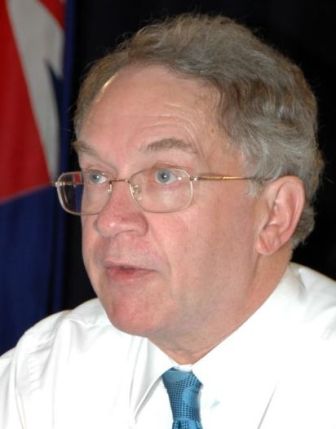Finance woes won’t delay Constitution says Governor
 (CNS): As Caymanians wait on the announcement of the "Appointed Day”, the official date when the new Cayman Islands Constitution will take effect, Governor Stuart Jack has said that, while he was aware of the current financial situation, it would not delay the Constitution’s implementation. He said that the date would be later this year but there was considerable legislative work to be done before then. Along with amending laws, he explained that a number of bodies would also need to be established as well as preparations for a minister of finance.
(CNS): As Caymanians wait on the announcement of the "Appointed Day”, the official date when the new Cayman Islands Constitution will take effect, Governor Stuart Jack has said that, while he was aware of the current financial situation, it would not delay the Constitution’s implementation. He said that the date would be later this year but there was considerable legislative work to be done before then. Along with amending laws, he explained that a number of bodies would also need to be established as well as preparations for a minister of finance.
“We are certainly conscious of the financial implications and are looking at economical ways of implementing the new Constitution, for example how we organise administrative support for the new bodies. But we should not have to delay for this reason the implementation of something so fundamental as the Constitution,” Governor Jack stated in an email correspondence to CNS on Tuesday.
He said he hoped to be able to inform the people of the "Appointed Day" in a couple of months time. But before then, many new features to the new Constitution will need to be addressed — new bodies will have to be appointed, along with new ways of working. The governor noted that the Advisory District Councils would take considerable work and the priorities at present were the necessary amendments to laws that must be in place on day one of the new Constitution.
He said the Electoral Boundary Commission, the Advisory Committee on the Prerogative of Mercy, and the National Security Council must also be ready on the first day of implementation and preparations must be made to establish the newminister of finance.
“There is a transitional provision in the Order in Council establishing the Constitution that allows current arrangements to continue until the Judicial and Legal Services Commission is set up (e.g. the appointment of judges),” he added. “Our aim is to set up this body and others within a short period after the Appointed Day. That includes the Human Rights Commission, which will have an important educational role in the run up to the later implementation of the Bill of Rights.”
The new Constitution was passed with around 62% of the vote in a referendum which took place on General Election Day 20 May. The draftConstitution was then considered and approved by the Privy Council in the UK on 10 June and set before the UK parliament a week later, but it will not come in to effect until the governor sets the “Appointed Day”, when the existing 1972 Constitution will then be repealed in its entirety. However, even when the “Appointed Day" arrives not all of the stipulations will be implemented immediately. During the negotiations, for example, it was agreed that the Bill of Rights would be phased in over a three year period.
“None of us should underestimate the magnitude of the task before us, particularly in the lead-up to the start date. The completion of all this work will require the full cooperation and coordination of government agencies, the Cabinet and the Legislative Assembly,” the governor said in the wake of the Constitution’s approval in the UK.
The governor stated recently that he had appointed a small team of civil servants under the Deputy Chief Secretary to identify the tasks that are absolutely essential before the new Constitution can be brought into effect.
Category: Headline News

